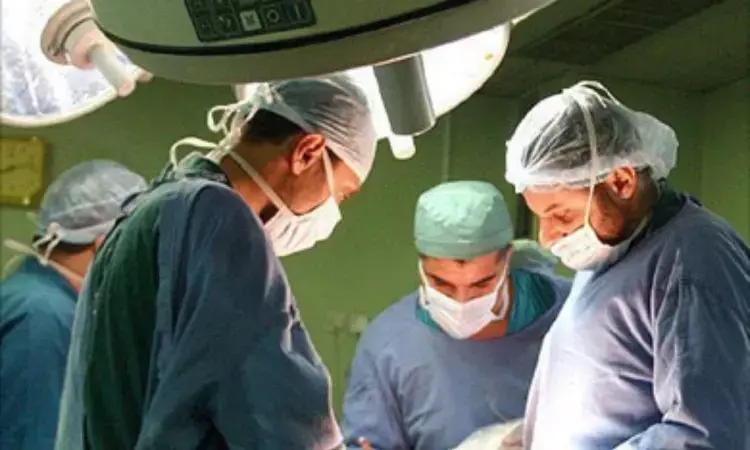- Home
- Medical news & Guidelines
- Anesthesiology
- Cardiology and CTVS
- Critical Care
- Dentistry
- Dermatology
- Diabetes and Endocrinology
- ENT
- Gastroenterology
- Medicine
- Nephrology
- Neurology
- Obstretics-Gynaecology
- Oncology
- Ophthalmology
- Orthopaedics
- Pediatrics-Neonatology
- Psychiatry
- Pulmonology
- Radiology
- Surgery
- Urology
- Laboratory Medicine
- Diet
- Nursing
- Paramedical
- Physiotherapy
- Health news
- Fact Check
- Bone Health Fact Check
- Brain Health Fact Check
- Cancer Related Fact Check
- Child Care Fact Check
- Dental and oral health fact check
- Diabetes and metabolic health fact check
- Diet and Nutrition Fact Check
- Eye and ENT Care Fact Check
- Fitness fact check
- Gut health fact check
- Heart health fact check
- Kidney health fact check
- Medical education fact check
- Men's health fact check
- Respiratory fact check
- Skin and hair care fact check
- Vaccine and Immunization fact check
- Women's health fact check
- AYUSH
- State News
- Andaman and Nicobar Islands
- Andhra Pradesh
- Arunachal Pradesh
- Assam
- Bihar
- Chandigarh
- Chattisgarh
- Dadra and Nagar Haveli
- Daman and Diu
- Delhi
- Goa
- Gujarat
- Haryana
- Himachal Pradesh
- Jammu & Kashmir
- Jharkhand
- Karnataka
- Kerala
- Ladakh
- Lakshadweep
- Madhya Pradesh
- Maharashtra
- Manipur
- Meghalaya
- Mizoram
- Nagaland
- Odisha
- Puducherry
- Punjab
- Rajasthan
- Sikkim
- Tamil Nadu
- Telangana
- Tripura
- Uttar Pradesh
- Uttrakhand
- West Bengal
- Medical Education
- Industry
Single-diaper technique simplifies postop care in kids with hypospadias

A new study published in Journal of Pediatric Urology showed that following hypospadias correction, single-diaper method is not associated with an increased risk of problems as compared to double-diaper treatment.
After hypospadias correction, the double-diaper method with an open-drainage catheter is commonly used. However, it has not been assessed against single-diapering with an open-drainage catheter, which may increase the burden of postoperative care. Khaled Aldabek and colleagues undertook this study to see if the single-diaper approach is related with poor surgical results than the double-diaper technique.
A single surgeon database was searched for individuals who had hypospadias surgery between 2013 and 2021. Patients who were lost to follow-up and those whose nappy care type (single or double) was not reported were omitted. Except for leaving the catheter freely draining into a single-diaper, patients in the single-diaper procedure got the same sort of dressing and discharge instructions as those in the double-diaper group. The primary result was surgical site infection (SSI), urinary tract infection (UTI), and wound dehiscence, whereas long-term urethroplasty sequelae were secondary outcomes. The outcomes were analyzed based on the kind of nappy care.
The key findings of this study were:
1. Among the 323 patients assessed, 219 satisfied the inclusion criteria (72 in the double-diaper group and 147 in the single-diaper group).
2. In terms of patient demographics, hypospadias features, and surgical method, both research groups were comparable.
3. There was no statistically significant difference in SSI, UTI, or wound dehiscence when the primary outcomes were examined.
4. In terms of secondary outcomes, the incidence of meatal stenosis (8.3 vs. 1.4%, p=0.044) and fistula development (15.3% vs. 5.4%, p=0.037) was substantially greater in the double-diaper group than in the single-diaper group.
This retrospective analysis, however, cannot rule out the influence of unmeasured confounding variables on the outcomes, such as surgeon experience and surgical technique advancements.
Reference:
Aldabek, K., Luketich, S., Abdelhalim, A., Elbakry, A., & Al-Omar, O. (2023). Double Versus Single Diaper Technique After Hypospadias Repair, Does It Really Matter? In Journal of Pediatric Urology. Elsevier BV. https://doi.org/10.1016/j.jpurol.2023.06.001
Neuroscience Masters graduate
Jacinthlyn Sylvia, a Neuroscience Master's graduate from Chennai has worked extensively in deciphering the neurobiology of cognition and motor control in aging. She also has spread-out exposure to Neurosurgery from her Bachelor’s. She is currently involved in active Neuro-Oncology research. She is an upcoming neuroscientist with a fiery passion for writing. Her news cover at Medical Dialogues feature recent discoveries and updates from the healthcare and biomedical research fields. She can be reached at editorial@medicaldialogues.in
Dr Kamal Kant Kohli-MBBS, DTCD- a chest specialist with more than 30 years of practice and a flair for writing clinical articles, Dr Kamal Kant Kohli joined Medical Dialogues as a Chief Editor of Medical News. Besides writing articles, as an editor, he proofreads and verifies all the medical content published on Medical Dialogues including those coming from journals, studies,medical conferences,guidelines etc. Email: drkohli@medicaldialogues.in. Contact no. 011-43720751


